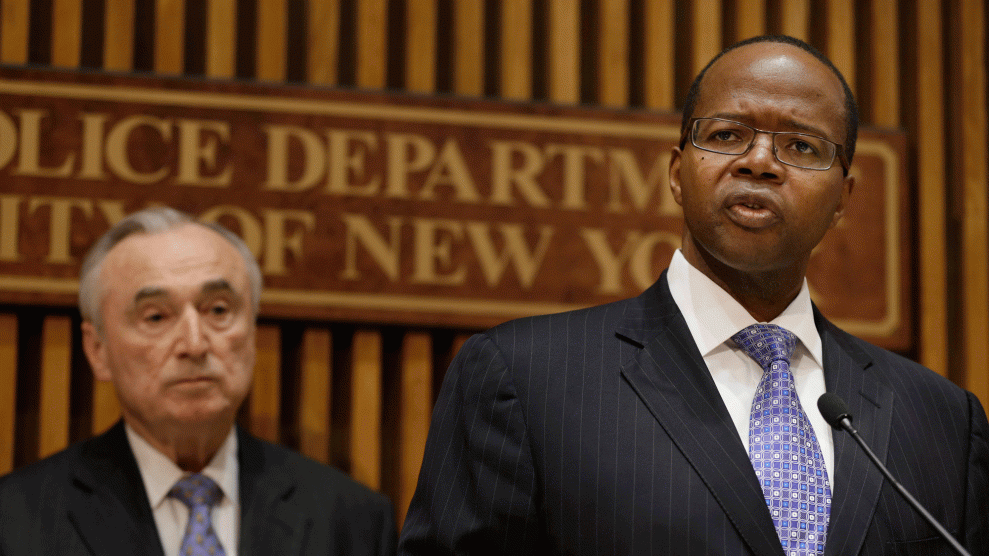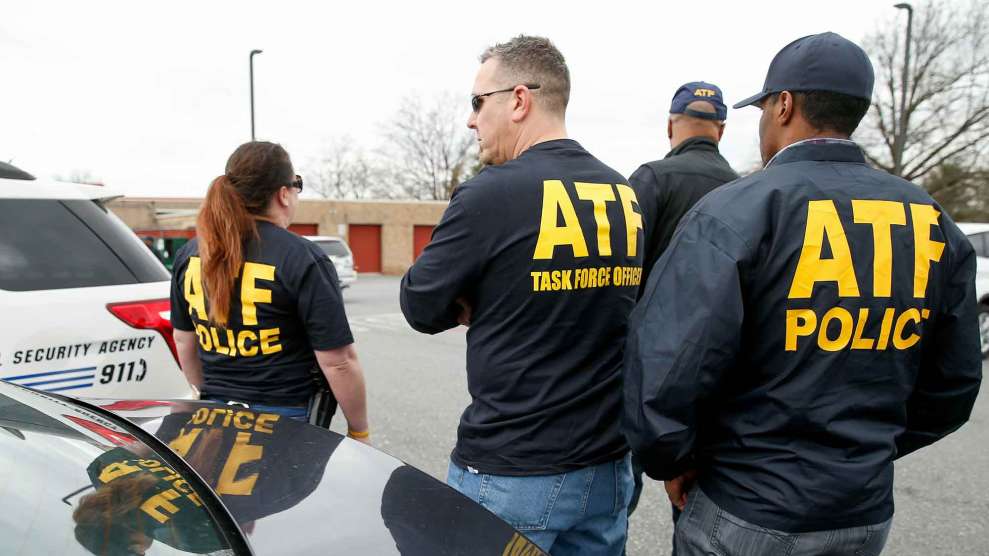
In April 2014, New York City Police Commissioner Bill Bratton, left, and Brooklyn District Attorney Kenneth Thompson spoke about the arrest of six people who transported 155 guns from Georgia and sold them to an undercover officer in Brooklyn. Seth Wenig/AP
Rep. Caroline Maloney (D-N.Y.) first learned that there is no federal law against gun trafficking at, of all places, a Fast and Furious hearing. In June 2011, the House Committee on Oversight and Government Reform convened to scrutinize the gunrunning sting known as Fast and Furious, which had flown off the rails when agents from the Bureau of Alcohol, Tobacco, Firearms, and Explosives (ATF) allowed assault weapons to land in the hands of Mexican drug cartels. Much of the hearing was occupied with Republicans skewering the Obama Administration, but for a moment, the narrative flipped when Peter Forcelli testified. Forcelli, the ATF’s Phoenix field office supervisor, described just how difficult and often pointless it is to go after gunrunners. He described the existing laws against them as “toothless,” adding that it’s “difficult to obtain convictions.”
Maloney recalls being astounded by what she heard. “He basically said, ‘We don’t even prosecute illegal gun trafficking because there is no real penalty.’ After that hearing I questioned him more. I looked at it and there was really no federal crime for buying a gun and giving it to another person who couldn’t get it, or selling guns to drug cartels, traffickers, whatever.”
According to the ATF, 50,000 firearms are illegally trafficked across state lines every year. Yet the closest thing to a federal anti-gun trafficking law is a prohibition on “straw purchasing”—when someone buys guns for people who legally can not. But that offense is usually prosecuted as a minor paperwork violation and rarely results in prison time, even if the purchaser was part of a larger gunrunning ring. The penalties for straw purchasers “are very, very low,” says Lindsay Nichols, a senior attorney at the Law Center to Prevent Gun Violence. Convicted buyers get “maybe one year of probation, maybe some community service.” Gunrunners who face serious time will often get sent away on related charges, such as drug or financial offenses, which carry stiff penalties.
“Gun traffickers know what’s going on,” Brooklyn District Attorney Kenneth Thompson recently told me. Thompson made going after gunrunners a personal crusade during his time as DA, taking more than 550 illegal guns off the streets between 2014 and his untimely death from cancer late last week. “They can make a substantial amount of money trafficking in these weapons, and the penalties are not that severe,” Thompson said. “They get people who have clean records to buy these guns and give them to these gun traffickers, knowing that they’ll be used to commit crimes. Gun violence and gun trafficking go hand in hand.”
In the 2011 Fast and Furious hearing, Maloney pressed ATF agent Forcelli on what might help law enforcement go after gun traffickers more effectively. He responded, “I think that perhaps a mandatory minimum of a one-year sentence might deter an individual from buying a gun. Some people view this as no more consequential than doing 65 miles per hour in a 55 mile per hour zone.”
Two years later, in February 2013, Maloney introduced the Gun Trafficking Prevention Act, which would increase the penalties for straw purchasing to up to 20 years in prison, and also finally made firearms trafficking a federal crime that could add up to 5 years to gunrunners’ sentences. The lessons she took away from the Fast and the Furious hearing remained fresh, as did a later hearing on the crimes of William Spengler, who in 2012 murdered his sister and set fire to his house, then ambushed firefighters and cops, killing two and wounding two before being shot himself. Because Spengler was a felon—he’d bludgeoned his grandmother to death with a hammer two decades earlier—he used his 22-year-old neighbor in Rochester, New York, to buy the AR-15 and pistol-grip shotgun that he used for the murders.
Law enforcement groups, including the Federal Law Enforcement Officers Association, Major Cities Chiefs Association, and the Police Foundation, came out in support of the proposed legislation. It was also the first bill of its kind to attract bipartisan support. Five Republicans signed on as cosponsors, including Rep. Scott Rigell (R-Va.), who had an A- rating from the National Rifle Association (NRA). He commended the bill as “common sense legislation…directed at keeping guns out of the hands of criminals.”
Then along came the gun lobby. The NRA pushed against the bill, and it never got out of committee. Its Senate counterpart, however, raced through the Judiciary Committee and appeared poised to win full Senate approval. That came to a quick end after the NRA demanded a change to the bill’s straw purchasing clause that would require prosecutors to prove that purchasers knew they were buying guns for someone who was legally prohibited from owning one or was intending to commit a crime. It was, as Maloney puts it, “a nearly impossible standard.” The bill died the following week.
Rigell, who was up for re-election the next year, became the target of an even more hardline gun rights organization. The National Association for Gun Rights, which bills itself as the “fastest growing guns right group in America,” had launched a million-dollar campaign to go after any members of Congress who supported new gun laws. NAGR’s attack ads depicted Rigell as a gun-grabber who “who wants to pass Obama’s gun control” and “wants gun owners in a federal registration system”—something that was nowhere to be found in the gunrunning bill and that Rigell had never advocated. At the end of the ad, a voiceover stated, “Scott Rigell doesn’t sound like a Republican” as his face morphed into President Obama’s.
“I outright oppose any initiative that would directly or indirectly result in the creation of a national database of firearms and or firearm owners,” Rigell said in an interview with Politico at the time. “Their charge that I am leading this, that I am supporting this, is an egregious lie, and completely unfounded…They are lying about who I am.”
Despite the misleading ads, Rigell won his 2014 primary. But when Maloney reintroduced the gun trafficking bill in the next session of Congress, he was notably absent from the list of co-sponsors. Maloney views the fallout from her bill as a lesson in how the gun lobby operates. “What they do, if someone does go on a bill, they then go after that person, and make them an example. They target whoever is doing it and try to defeat them or go after them so that other people become scared and don’t do it.”
In the meantime, straw purchasing and gun trafficking continue largely unabated. While many prosecutors find gunrunning cases daunting or unrewarding, Brooklyn DA Kenneth Thompson was one of few who tried to tackle them. In October 2015, Thompson served an 8-member gunrunning ring with a 541-count indictment for smuggling more than $130,000 worth of guns into New York City. Michael Bassier, the 31-year-old ringleader, used a collection of straw purchasers to buy weapons from southern states before transporting them north on buses. It was Thompson’s third major bust of a gun trafficking ring.
But there are always more weapons out there. “I’m concerned that there are so many ways for them to flood our streets with guns,” Thompson told me. “The guns are coming up in cars, in Chinatown buses, on airplanes. These traffickers are exploiting weak gun laws. It’s left up to state prosecutors like me.” He added that sting operations to find and bust gun dealers are costly and “involve great danger to the undercover agent.”
Maloney is thinking of adding new elements to her bill, such as a minimum sentence for straw purchases. “Of all the bills that we have out there,” she laments, “the one that there absolutely is no argument against is the Gun Trafficking Prevention Act. This is a bill that law enforcement has literally asked for.”
Without a federal law against gun trafficking, gunrunners, more often then not, will get off easily, regardless of where their weapons end up or how they’re eventually used. “The fact that we don’t have a federal law prohibiting firearms trafficking is simply outrageous,” said Thompson. “Until we have our federal government step up, it’s going to continue to be a problem.” Until then, cops and prosecutors will be left to their own devices. With Thompson gone, now there’s one less DA focused on the problem.
















